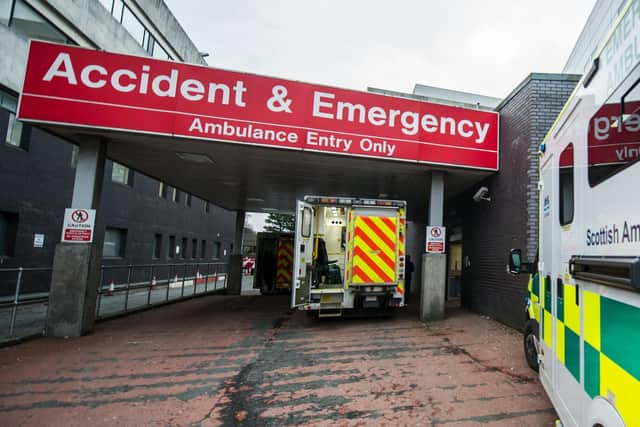Covid Scotland: Tories warn of ‘winter storm’ in Scotland’s emergency departments
and live on Freeview channel 276
The stark warning comes after figures last week reported the worst accident-and-emergency (A&E) performance on record across the country, with less than 65 per cent of patients attending emergency departments being seen within four hours.
The Scottish Government’s target sits at 95 per cent of patients being seen in this timeframe.
Advertisement
Hide AdAdvertisement
Hide AdAnalysis carried out by the Tories suggests A&E performances against the four-hour target time are usually worse during winter months than they are in the summer.


On average, the party says, performance in emergency departments has been down by more than five percentage points compared to the summer.
This gap widened to nine points in 2017 and 2020, it said.
Dr Sandesh Gulhane, health spokesman for the Scottish Conservatives, has now suggested the Scottish Government’s NHS Recovery Plan needs to be “urgently rewritten” before the winter months roll in.
He said: “Right across Scotland, patients are already experiencing a summer of chaos with the longest waits ever for treatment in our NHS.
Advertisement
Hide AdAdvertisement
Hide Ad“Waiting times at A&E hit another record high on Humza Yousaf’s watch last week, yet the worst may still be to come for suffering patients and heroic frontline staff.
“Every year we have seen performance in our hospitals being better in the summer and worse in winter.
“Waiting times are already at a record high and the number of patients waiting for treatments is ever increasing.
“Suffering patients and staff who are beyond breaking point will likely face a winter storm later in the year.”
Advertisement
Hide AdAdvertisement
Hide AdDr Gulhane said the NHS Recovery Plan “isn’t cutting it”, and that a new document should “support staff at every turn to improve standards, before the winter period hits”.
The warning comes as new figures revealed more than 4 per cent of triple-vaccinated adults are self-reporting having long Covid 12 to 16 weeks after contracting one of the Omicron variants.
The result is just marginally lower than the 5 per cent who are experiencing long Covid during the same period after being infected by the Delta strain.
Daniel Ayoubkhani, from the health analysis and life events division at the Office for National Statistics, said: These findings may not apply to people who have previously had Covid-19 and have been reinfected with the Omicron variant, and we cannot say what the implications are for any future variants in terms of long Covid risk.”
Comment Guidelines
National World encourages reader discussion on our stories. User feedback, insights and back-and-forth exchanges add a rich layer of context to reporting. Please review our Community Guidelines before commenting.